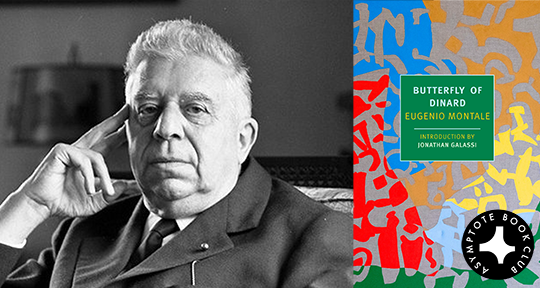In the fifty short stories that make up Butterfly of Dinard, the great lyric poet Eugenio Montale turns to prose to inscribe the world that moves the psyche to its most extraordinary heights. As one of the most inviting additions to a remarkable oeuvre, the collection moves from mystery to comedy, from reminiscence to fantasy, taking the reader on excursions and immersions, introducing an Italy grasped in historical and personal material alike. The Montale admirer will find motifs that correspond with his most famed poems, and anyone new to the writer will find an assured, perceptive voice, dedicated to documenting the most curious and complex intersections of our social reality. Reissued now by New York Review Books in an updated translation from Oonagh Stransky and Marla Moffa, and with an illuminating introduction by Jonathan Galassi, we are delighted to introduce Butterfly of Dinard as our Book Club selection for the month.
The Asymptote Book Club aspires to bring the best in translated fiction every month to readers around the world. You can sign up to receive next month’s selection on our website for as little as USD20 per book; once you’re a member, join our Facebook group for exclusive book club discussions and receive invitations to our members-only Zoom interviews with the author or the translator of each title.
Butterfly of Dinard by Eugenio Montale, translated from the Italian by Oonagh Stransky and Marla Moffa, New York Review Books, 2024
After the walkman came into common use, a reporter in the Nouvel Observateur did a self-directed study on its effects, going around and asking its users if they considered themselves psychotic or schizophrenic. Clearly, the world of music had grown a new frontier. There would be communal listening, through the radio or some other form of public broadcasting, and solo listening; one could have a personal sonic timeline, running separately—though parallel—with the rest of the world’s sounds. Since then, we’ve only found new and improved ways to insulate ourselves from the social environment, so when a friend and I took a rental car around Los Angeles a month ago, I hadn’t heard the radio in probably a decade. When we turned it on, running through station after station, I catalogued the brief soundbites of the local airwaves—jockey banter, garbled trap, Christian rock, upbeat grupera. That frenetic soundscape accordioned over the brushed hills and highway traffic, and we synced to it, suddenly adopted into the city’s musical timestream as insiders. After a little while, we stopped at a light, and I looked to the car beside me. I couldn’t hear what the driver was listening to, but the taps of his fingers hit the exact same beats as those from our radio.
Music, and its innate potential for disrupting separation, was on my mind while reading Eugenio Montale’s Butterfly of Dinard, a collection of prose pieces first published in the daily Corriere della Sera. The newspaper, similar to the radio, is a halfway-abandoned arena of public consciousness—a gathering place where people can experience the same thing at relatively the same time, and be joined, if not in opinion, then in engagement. But the days in which radically dissonant lives and perspectives could be unified via song or text are largely gone; though the cultural artifacts themselves are more proliferate than ever, we meet them on terms that are ever more individualised, ever more catered to the psychic patterns that we build, alone. Passing through Montale’s slice-of-life writings, some tell stories of the past, some follow the mania of dreams, but running through all of them is a sense that they are being told in the textual version of the town square—meant for all to hear, no matter if you are sat in the audience or just passing through. These stories are a spatial message; they tell of living amongst, and in this way, they belong to everyone. READ MORE…

